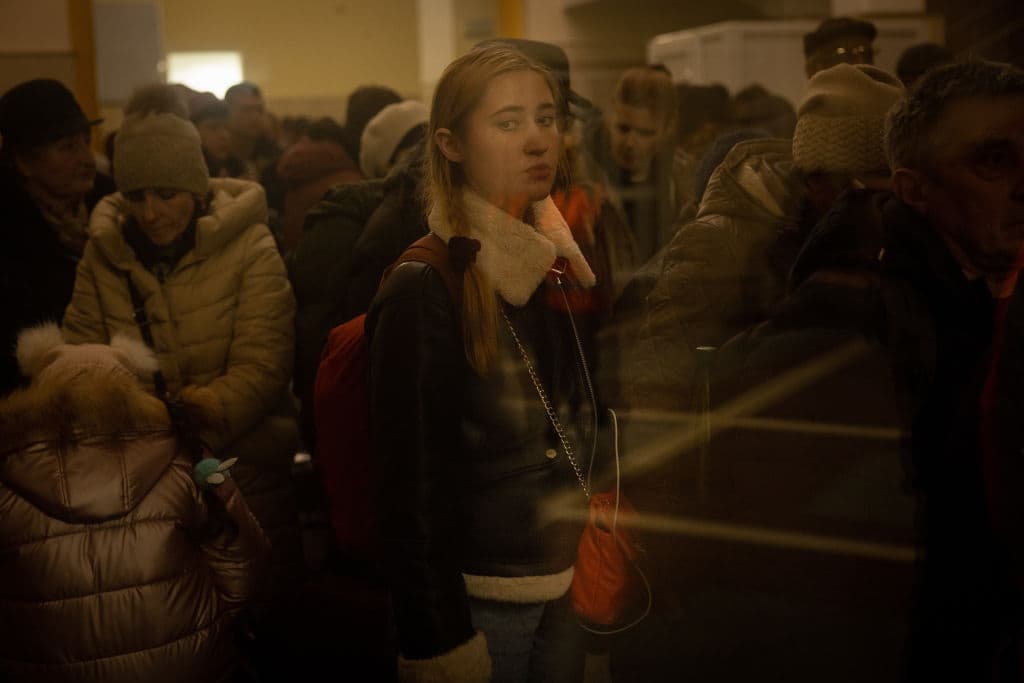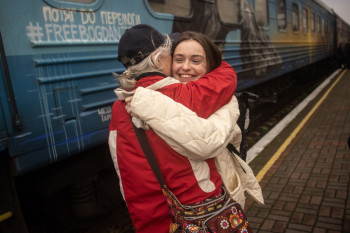After surviving Russian occupation, civilians flee Kherson amid intensified shelling

KHERSON – KYIV – Kherson residents sat in an eerily quiet overnight train to Kyiv. It was Nov. 25, and they were leaving their hometown for the first time since February.
The evacuees spent almost nine months under Russian occupation in Kherson, waiting for the arrival of Ukrainian forces.
But a few weeks after Ukraine liberated Kherson, Russian forces began shelling the city they had lost on Nov. 11. Since then, and as of Nov. 26, Russian attacks had killed 32 civilians in Kherson.
Each day, hundreds are fleeing Kherson due to fears of bombardment.
Sitting upright on the lower bunk of a sleeping compartment, Mykola said he decided to flee Kherson after an intense Russian shelling hit his district on Nov. 24, killing seven people. Coming from eight months of Russian occupation, the man wasn’t comfortable providing his last name.
During the shelling, the 71-year-old said he saw the walls shake and immediately understood the danger. His health condition worsened during the occupation, adding to his decision to leave Kherson.
Mykola plans to stay at his son's place in Kyiv. He has no long-term plan or savings. He doubts he will be welcomed if the stay is extended.
"I lost my hometown, where I grew up, worked, and created a home for my family," Mykola told the Kyiv Independent. "Now I'm out and homeless. I have no home. I have no property – I have nothing."

Another Kherson native, Iryna Mikhieieva, left the city on Nov. 27. Standing on the platform in Kyiv the next morning, she shared that she had second thoughts about fleeing the city when electricity was restored just before her train took off. Before that, Kherson was left without electricity, heating, and water for most of November.
Governor Yaroslav Yanushevych said on Nov. 27 that the power supply had been restored for 17% of households.
But Mikhieieva, 81, decided not to take chances.
"I didn't want to leave Kherson, but we were forced to because they (Russians) are shelling (the city)," the woman said shortly after arriving at the Kyiv Central Railway station.
Mikhieieva added that living conditions were becoming more challenging as the weather got colder and Kherson still had no heating. Russian forces had sabotaged the city’s systems, including electricity and therefore heating supply, before they were forced to withdraw. Later, shelling damaged the systems further.
With her long-time friend and neighbor Lidiia, who said she saw a shell hit about 150 meters away from her on Nov. 24, Mikhieieva packed whatever she could carry and fled to Kyiv.
The two neighbors got closer through hardships, from their husbands' deaths to surviving Russian occupation together.
"We decided to flee immediately after this bombardment," Mikhieieva said.

Anastasiia Bohaturenko, 42, decided not to wait for a Russian shell to land near her place and left Kherson on Nov. 27. She plans to hop around friends' places in Kyiv and Odesa until she figures out a plan.
Shelling is growing louder in Kherson, and casualties are rising.
Over the past week, Russian shelling of Kherson killed 15 people, including a child, and wounded 35, according to Head of Kherson City Council Halyna Luhova.
On Nov. 24 alone, the Russian military carried out 17 attacks on the city, killing seven and injuring 21 people.
Governor Yanushevych accused Russia of using "terror tactics" to threaten civilians in liberated parts of the region, including the regional capital Kherson.
Despite that, the evacuees on the Kherson–Kyiv train told the Kyiv Independent they were determined to return to their native city as soon as the shelling calmed down.
____________________
Note from the author:
Hi, this is Asami Terajima.
Thank you for reading my story till the end. The Kyiv Independent team has been selflessly covering Russia's brutal war against Ukraine since day one, doing our best to keep the world informed about the latest developments at home. Please consider supporting the young and driven newsroom by becoming our patron.










